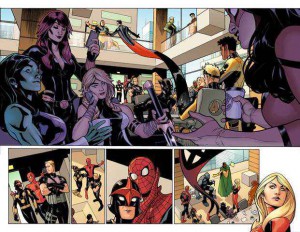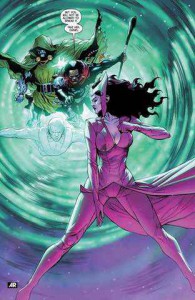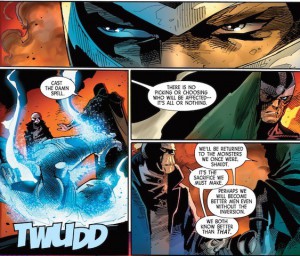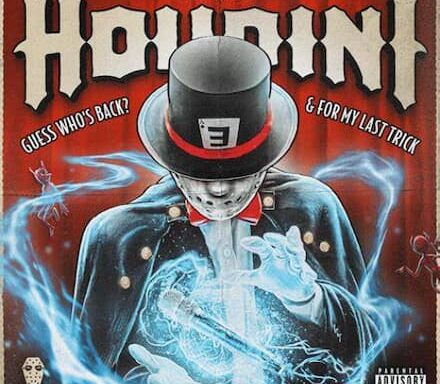Having already quite extensively reviewed Avengers/X-Men: Axis #1 – 4 a couple of months ago, I’ve finally got around to putting together a review for the second half of last year’s mammoth Axis event.
In the initial review, I wrote that the best parts of the Axis storyline had occurred in the early stages and the lead-in material, such as in the pages of the Magneto solo title, Loki: Agent of Asgard and particularly Uncanny Avengers and the early confrontations between Magneto and the Red Skull; and that the main Axis #4 issue was where the things started to get really silly and the quality level massively dropped.
Unfortunately things didn’t get any better from that point on.
Like the first four issues, there are some cool moments and windows of quality to be found – if you look hard – across Axis #5 – 9, but not many. And there’s no point in any of these books that reaches the (comparative) heights of some of the earlier lead-in material, particularly in Uncanny Avengers #24 and #25. Following a major plunge in both quality and direction in Axis #4, Axis #5 and the ‘Inversion’ portion of the series continues that trend.
Fittingly enough, the title declared in big letters for Axis #5 was ‘Something Clearly Went Wrong’; and so it did.
However, Spiderman provides some refreshing Spideyisms right from the start of #5, injecting a brief new energy into the affair. The recent Spider-Verse stuff aside, I haven’t read Spiderman comics in any meaningful way for a long time, but his presence here was very welcome. There’s some fun Spiderman/Nova banter to enliven things here. On the same note, there’s some nice Spidey banter with Hawkeye too. Sadly the silliness resumes pretty quickly after this brief reprieve, with the permanently dreary Sam Wilson shrinking half the Marvel Hero-verse and trapping them in Hank Pym’s sub-atomic ant farm.
Which is incredibly silly.

Spiderman and Nova escaping in the nick of time is at least kind of cool, but Wilson’s ploy also makes the rest of the assembly of heroes look a little incompetent for not reacting quick enough; I’m going to give them the benefit of the doubt and assume that Spidey and Nova literally being closest to the window was a big help. Regarding that opening sequence, it was also pretty wasteful to show the Black Panther present and then not use him at all in the story; even a couple of intelligent T’Challa bits of dialogue might’ve helped (maybe something along the lines of “this story is getting less and less readable with each new page”).
Wanda then flying through New York is too goofily vampire-esque to be taken seriously; she’s even drawn with sharp nails and vampish overall demeanour over-emphasised. However, Magneto coming to the rescue of Spidey and Nova is a cool enough moment; even if simply because… well, it’s Magneto coming to the rescue of Spidey and Nova.
‘Kluh’ (“the Hulk’s Hulk”) is still the dumbest idea ever though. The dumbest idea ever.
And every time he appears (or worse, speaks) I can feel my face contorting into an embarrassed cringe as I quietly hope no one peers over my shoulder and witnesses the inane childishness of the material I’m currently reading.
In general the characters and situations feel so false as to be virtually unreadable for most of the story.
By the time Apocalypse and his newly bad-ified X-Men arrive in New York at the end of Axis #5, all the credibility and menace has long since evaporated from the story and what should be a big, dramatic moment in fact doesn’t translate as anything of the sort. “This is the doom I feared most; Apocalypse is upon us,” says Magneto. The problem is the emergence of Apocalypse in this storyline is so utterly lacking in bite that it just falls flat and one of the most awesome, formidable villains in the Marvel Universe ends up looking just silly for the most part.
The sense of awe around Apocalypse is completely lost across this story. To use Apocalypse (even if it is really Genesis) so poorly is pretty much criminal in writing terms.
And there remain areas and issues that could’ve been more interesting to explore, but which are merely hinted at and then glossed over in these pages. Sam Wilson’s rant about the world needing a new ruler, one strong voice to rule it, was in effect more Sideshow Bob than Emperor Palpatine, but it could’ve been much more.
“Democracy has failed”, he says, going on a rant about the corruption and failings of government. With better circumstances and a better backdrop this could be a very interesting route to have gone down in a more meaningful way, but with so much silliness going on all over the place the theme is pretty much still-born, unable to find any breathing space.

The X-Men are as awfully written as the Avengers, with overdone villain dialogue and a complete and utter lack of any depth. The worst of these is Rogue, who is forced to spout out the kind of awful dialogue over and over again that just doesn’t work for her (“today ends the era of human domination”).
Heroes turning bad and doing things contrary to their normal moral compasses is fine; as a concept, that can be interesting. But the way all of them also lose all of their complexity, dimension and reason at the same time guts the whole story; how come you can’t ‘turn bad’ but also still have reasoning and dimension? Surely *that* would be much more interesting and engaging? The implication that by ‘turning bad’ you also experience a complete and utter reversal of every personality trait is a little insulting; it is in fact a child’s view of human psychology.
They’re all pretty badly written, but Rogue seems the worst, I guess because she’s always been one of my favorite characters and it’s especially irritating having to watch her speak lines that you know she would never speak. What’s so stupid is that her entire vocabulary and speech-patterns seems to have completely transformed too, so that she sounds more like Mr Sinister or Stryfe than Rogue; what’s the point there? That turning all bad-ified also means inheriting the speech-patterns of a villain too?
It’s not just Rogue though, it’s mostly everyone.
Cyclops and Havok perhaps don’t seem quite as jarringly out-of-character, but that might be due to Cyclops already having gone down a more rebel path in recent years and also possibly due to my memories of the Summers brothers’ characterization in the Age of Apocalypse event from twenty years ago. But generally the problem is we sympathize so little with anyone in this storyline by now that it no longer matters what happens to any of them.
Axis #6 boasts a pretty awesome cover, by the way – all the main Axis issues have pretty awesome covers, for that matter; this one with a dramatic image of Wanda and Doom with Magneto looking on.
#6 to start with gives us Mystique showing up to dissuade the Apocalypse-led mutants from their extreme (and silly) path; Kurt and Rogue being sent out to dispose of her makes some thematic sense, but unfolds with the same combination of really bad dialogue and general unreality that blights everything else in the story. Rogue dropping Raven from halfway up the city skyline is a pretty cool sight in basic terms; while the good-ified Sabertooth leaping to her rescue has some echo in the Age of Apocalypse version of Victor Creed, though with not as much of the AoA charm.
Returning to Doctor Doom in Latveria on the other hand is a highlight; Doom has been in fact the best thing about the entire Axis storyline. His remorseful monologue here is great; the scene where Doom is addressing his people, apologizing for his tyranny and promising change and a new era is just superb. “Latveria is henceforth a democracy,” he declares, as he even prepares to remove his mask and reveal his true face to his subjects. The ‘Gaddafi theme’ I already illustrated in this previous post continues here; though I’d bet good money I’m still only person in the world making that analogy.
The problem is that this would be a really rich vein, a really good theme to explore at more length and depth and not merely this minor sub-story contained within the bigger AXIS nonsense; this could’ve been really great in other circumstances. I would love to read a mini-series of just Doom and his post-Inversion experiences.
And then Bad Wanda shows up and attacks and the brief window of quality is destroyed, the embarassing dialogue resumes, and Wanda behaves like a spoilt child and nothing even *approaching* an interesting, layered character. Magneto and Quicksilver come to stop Wanda and have a family reunion; which for a moment seems like it might make things more interesting. Quicksilver, however, is a bit dull these days. I haven’t read any of the current X-Factor yet, but it seems to me like the more engaging Pietro Maximoff of the early nineties’ X-Factor run is AWOL. There’s also an entirely forgettable Loki/Thor encounter here in #6; god, Thor is a dull guy. I don’t remember him being this dull in the past, but maybe he always was; certainly compared to Loki or Angela, he is so lacking in interest or complexity.

So onto Axis #7 and the terrible dialogue continues right off-the-bat. “Was hoping for one more chance to crush human skulls with my hands”, says Rogue. Oh God, Rogue, please stop; you know I love you, but just sit this one out, please.
The saving grace of #7 (and actually of some other parts of Axis too) is Deadpool’s classic comic-relief quality. Deadpool suggesting Genesis needs to be taught to strive for “less Age of Apocalypse, more Age of Aquarius” is a classic example; hippy Deadpool’s flower-power dialogue throughout #7 is genuinely funny, gives the whole thing a more poetic undercurrent. Though even he can only raise the entertainment level briefly, given everything else going on.
The Wanda showdown with her family begun in #6 continues in #7 and is supposed to be intensely thematic, etc; but isn’t. It just falls very flat. Visually it is stunning, however; which a lot of the Wanda-centered sequences seem to be in these books (Axis #7, Avengers World #15, etc). That’s sort of strange, but Wanda for some reason seems to lend herself to very good illustration and particularly colours.
This visual quality, however, is the only good thing about this side of the story.
Wanda’s harsh assault on her brother on pg 16 is visually hugely reminiscent of the famous Magneto/Wolverine clash of X-Men #25 (1993), maybe even a homage, with Wanda off on her poetic diatribe here just like Magneto was back in X-Men #25. Nothing like as effective or evocative though. Even Magneto’s reaction here to Wanda’s assault on Pietro fits that theme, him substituting for Jean Grey in the X-Men #25 analogy. I’m pretty sure Quicksilver was in X-Men #25 too. I also realise there’s so little good to say about Axis that I’ve now deviated into a discussion about a comic book from 20 years ago; so getting back to the matter at hand, there’s a just an underlying lack of substance to everything that’s happening, exacerbated by the knowing sense that none of this will matter soon.
Actually that’s not entirely true: Wanda’s ‘curse on the bloodline’ and ‘ending the line’ may have implications beyond Axis, according to what I’ve been vaguely hearing. I’m not sure what that will do to the existing mythology; remains to be seen.
The Deadpool/Apocalypse fight at the end is brutal, but not thematically interesting in the same way as Magneto’s slaughter of Red Skull in Uncanny Avengers #25 was. It works on a charterer level in terms of the Deadpool/Evan dynamic (if not actually Apocalypse), but with all the surrounding silliness in the story it just unfolds like a random act of extreme violence and we’re desensitized by now. Deadpool is a highlight throughout, however; so at this point we’re literally watching the only entertaining character being savagely beaten out of the story, therefore leaving us even less to look forward to reading. It is though the only time in the entire series that Apocalypse actually seems dangerous or powerful. Still not dangerous enough though.
“The end of man is nigh” is all well and good to say, but it never actually feels like it at any stage in any of this. There was admittedly a point in Axis – probably up until the end of Axis #4 – where there was a genuine sense of apocalyptic danger and drama, but it evaporated from the inversion of Red Skull onward, leaving everything from #4 onward devoid of any real drama or sense of menace.
There’s all this grand, extraordinary stuff going on that we’re supposed to be terrified of or invested in, but it’s just looking at images on a page and reading words – it never translates beyond that into an actual feeling. This sense of unreality to everyone’s actions, everyone’s dialogue and everything that’s happening is similar to when you watch any Star Trek episode set in a parallel universe or alternate timeline and you absolutely know none of what you’re seeing is going to matter later on.
An example of how to really do a story like this with a genuine sense of stakes and urgency (as well as top-quality characterization) is X-Men: Second Coming from a few years ago; a story in which a genuine sense of urgency was conveyed throughout, where the stakes were palpably felt and where characters were written in a textured, mature way.
Amazingly for Axis #8 – which is supposed to be a climatic penultimate issue of a major event – so little of interest actually happens that I literally have nothing to say about it. Thor attacking Apocalypse might get the seven-year-olds a bit wet, but he may as well have been hitting nails with that hammer at this point. Frankly, I wanted Apocalypse to do to him what he did to Deadpool in #7.
Um, that’s about all there is to say about #8, other than… um, Mystique briefly appearing to Apocalypse/Genesis as Professor X on pg 18 is kind of cool; but as you can see, I’m really scraping the barrel here.
#8 concludes with Cap (sorry, Steve) rescuing the Red Skull (sorry the ‘White Skull’ at this point) from captivity and acts as the cliffhanger to lead us into the final installment of the story.

So into Axis #9 and the final chapter. By now of course we’re reading almost entirely out of the OCD need to finish what we started rather than having any great expectation of a last-minute save. So no, I wasn’t expecting much from this finale.
There’s more Thor/Loki boredom taking up page space. There’s a Cap/Wilson fight (sort of) at the beginning, which you probably have to be into the Rogers/Wilson relationship to get anything out of; though some out-of-character moments of sympathy between Schmidt (presently the ‘White Skull’) and Rogers make for an interesting momentary dynamic. There’s a half interesting Raven/Creed moment early on that isn’t especially relevant, but at least gives both characters some meaningful interplay and page-time.
There isn’t too much else to be said for Axis’s big climax. The restoration of everyone to their former state pretty much unfolds like clockwork, the story simply going through the motions. The villains taking public responsibility for all the carnage is, however, a fairly nice touch, giving some small degree of poignancy to the ending; even if it is, in effect, a massive get-out-of-jail-free card for both the ‘heroes’ and the writers.
If there’s any saving grace to this conclusion to Axis, it’s possibly that not quite everything goes back to normal (though mostly everything does).
For one thing, Sabertooth stays inverted. His letter/monologue as the ending to the book is kind of cool, gives the whole affair at least a touch of personalisation and a grounding in a character-based theme. Where this ‘good Sabertooth’ motif will go beyond this remains to be seen. It may just be a short-term gimmick. On the other hand, with Wolverine currently absent perhaps Creed is being used to fill his shoes. Might we see Creed ending up on one of the X-teams in Logan’s place at some point? That may have potential. The only two times I can think of that I’ve ever found Creed particularly interesting was, firstly, in his Age of Apocalypse alter-ego where he was in fact the Wolverine-like good guy and, second, during his stay at the X-Mansion as Charles Xavier’s guest and pet rehabilitation project – both stories being about twenty years ago. Whether what we see with him now proves to be as engaging as either of those examples might be interesting to see.
The two other notable non-resets in the conclusion to Axis are Havok and the Magneto family line. Havok, from what I can tell, isn’t properly fixed, while Wanda’s curse on her family seems to have somehow rewritten reality so that Magneto is no longer hers or Pietro’s father. I don’t really see the point of that; but maybe something interesting will develop out of that.
These things impart the Axis ending with some degree of possible relevance beyond the event itself; but they’re fairly small offerings in the context of how big and overblown this event was, how much space it took up, and how little of any real merit it did for most of its page-space.
There were some genuinely terrific moments early on in the lead-ins and tie-ins, but the main 9-issue series itself was hugely lacking in quality or sophistication on the story level and was in fact so bad at times in terms of how characters were written that it became frequently insulting. And when all was said and done, it didn’t really accomplish anything or have any great significance in the scheme of things. I admittedly got swept up in a bit of the hype, but actually the real reason was that, as I’ve said, some of those early lead-in books were really good: which made it inevitable I’d be compelled to commit to the whole thing.
In general, one becomes cynical towards big, hyped-up ‘events’ in comics.
In most respects, Avengers/X-Men: Axis is an example of how not to do a big crossover event. Other recent expanded events in Marvel books on the other hand are examples of how to do it much better; the recent Spider-Verse storyline was done terrifically, while for example last year’s X-Men/Guardians of the Galaxy: The Trial of Jean Grey was, though not perfect, a good example of how to tell a story really well even if the story itself has problems.
In many ways, the mark of a great series or storyline is whether one has any future desire to go back and re-read it: with Axis, I highly doubt anyone is going to have that desire.
And for the record, I never want to see ‘Kluh’ again. Ever.




